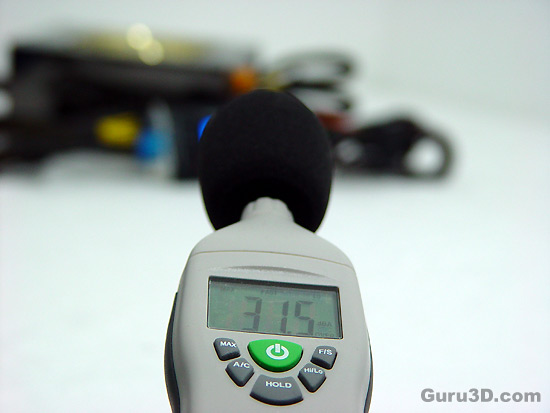Testing
Immediately we noticed how quiet this PSU is, with the side system case fan seemingly making the most noise. In the Guru3D Audio Lab we love quiet power supplies as to not interfere with our enjoyment of the latest PC audio gear. Lets get to some testing
Overclocking Tests
We decided to do some overclocking to gauge how stable to supplied voltages were on this PSU. Below are the results of our tests with a simple 200 MHz overclock putting the stock I7 860 to ~ 3.0 GHz.
|
Stock |
|
Overclock |
| |
|
|
|
|
|
|
|
CPU Clock |
2.8Ghz |
|
CPU Clock |
3.0Ghz |
|
|
|
|
|
|
|
Target(V) |
Actual(V) |
|
Target(V) |
Actual(V) |
|
3.3 V |
3.36V |
|
3.3 V |
3.36V |
|
5 V |
5.129V |
|
5 V |
5.119V |
|
12V |
12.144V |
|
12V |
12.144V |
|
CPU Core |
1.168V |
|
CPU Core |
1.176V |
We were surprised as the main supply rails were rock steady after this overclock, with the only variance being the core voltage being slightly elevated after the overclock. Although this is not a high overclock the supply rails remained stable.
Aside from the OC tests, we just used the PSU for our general tasks. Running newer games that push the GFX card and listening to audio as the STX is powered from a direct tap to the PSU.
Stability Testing the PSU
So during our tests we also monitor the voltage fluctuations as shown below in both IDLE and LOAD states of the PC. We write down the lowest and highest value we see within a certain PC state. The difference is the fluctuation. If a PSU is unstable we'd see a lot of fluctuation, differences and discrepancies which can result in system instability.

Once we gathered all Voltage results we can place them in an easy to understand chart. Look at the chart, the two lines show both the Idle and Load state of a specific voltage rail, the dark blue one the lowest voltage dip measured, the red one the highest fluctuation. That's your baseline.
So then, ATX specification requires that the PSU needs to stay within a 5% fluctuation; for example, each +12 Volt rail should remain between 11.4 - 12.6 Volts.
As you can see, the PSU when utilized stays consistent as you can hardly even see the blue line, meaning that the PSU is functioning within ATX specified limits. During the load test, I checked several times to see if the PSU was warm, it was cold to lukewarm really.
Sound levels (dBA)
As usual we grabbed our dBA meter. The human hearing system has different sensitivities at different frequencies. This means that the perception of noise is not at all equal at every frequency. Noise with significant measured levels (in dB) at high or low frequencies will not be as annoying as it would be when its energy is concentrated in the middle frequencies. In other words, the measured noise levels in dB will not reflect the actual human perception of the loudness of the noise. That's why we measure the dBA level. A specific circuit is added to the sound level meter to correct its reading in regard to this concept. This reading is the noise level in dBA. The letter A is added to indicate the correction that was made in the measurement.
 (reference photo).
(reference photo).
As always we measure 75 CM away from the product (usually the distance between you and a desktop computer).
HWith normal PC usage you will barely notice the PSU. Once we stressed the PSU towards 500 Watt it started to make a bit more noise. We measured 38 DBa audio pressure coming from the PSU, which is under the entire PC's volume pressure all by itself.
The "Silencer' is not 100% silent, but overall definitely silent enough.
